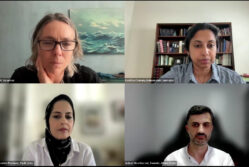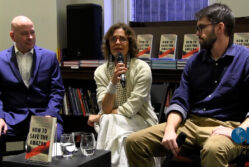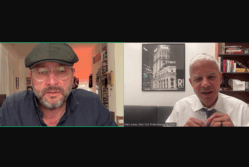Event Coverage Highlight

OPC Awards Dinner Honors Women and Exceptional International Journalism
 By Donna M. Airoldi
By Donna M. Airoldi
Foreign correspondents gathered on April 26 to celebrate their profession and honor those who have persevered in uncovering the truth despite the increasing challenges journalists face when doing their jobs.
“There is unfortunately no sign that reporting abroad is becoming any safer or any easier. There were at least 50 documented deaths of journalists last year, one of the worst years on record. Several hundred more have been jailed to stop their reporting,” said keynote speaker Joseph Kahn, managing editor of The New York Times. “We need the OPC now more than ever to keep our attention focused on the risks our colleagues are taking and to celebrate their best work.”
One of those journalists killed in 2017 was OPC member Kim Wall. The day before the awards her killer was sentenced to life in prison. Her parents, Ingrid and Joachim Wall, lit the Candle of Remembrance for journalists who have been imprisoned, killed or harassed while doing their jobs.
“We wish that we could sit over at our table as proud parents and see our daughter receive an award for her stories,” said Ingrid Wall. “We wish that every journalist in the world could do very important work without risking their lives. And we wish for the next year that there won’t be any need for a remembrance candle.”
Another of the evening’s themes focused on women on the frontlines. But as OPC President Deidre Depke noted, women have long been reporting from conflict zones as correspondents, photographers and producers, “and aside from the recognition they’re just getting now, we have all known that for decades they’ve been the backbone of great reporting.”
Kathy Gannon, senior correspondent for Pakistan and Afghanistan for The Associated Press received the prestigious President’s Award “for courage under fire and a deep commitment to bringing light to dark places.” She was attacked on April 4, 2014 by a gunman while reporting in eastern Afghanistan. AP photographer Anja Niedringhaus, who was with her, was killed. Gannon has endured several surgeries since then, and Depke noted that she was in town this week for her sixteenth. The crowd gave her a roaring standing ovation.
Gannon thanked OPC and noted her inspiration from a new generation of journalists. “I listened as one person spoke of his gratitude to those who share their stories, and truly my heart skipped a beat, because for me that’s the essence of who we are and what we do,” she said. “That is why I love this job. Because it allows me to give a voice to those who struggle to be heard.”
Along with others who cited attacks on the press around the world, and at home from our own president, Gannon noted the insults targeted toward the media “by the powerful, but I feel we have risen to the occasion,” she said.
“I feel it has inspired us to dig deeper, look closer and reconnect to the real reasons why we chose this profession. Whether it’s the suffering by the Rohingya Muslims driven from their homes, Yemenis tortured in secret prisons, or women killed in the name of honor, and those who would kill them, and of women assaulted by powerful men who thought that power alone entitled them and would guarantee their silence. But what we do when we tell these stories is we reveal awe-inspiring courage of those who choose to speak out.”
This year’s 22 awards were selected from 430 entries and reviewed by more than 90 judges. Three awards each were given for stories on defeating ISIS in Iraq and Syria, and on coverage detailing the consequences war has on civilians. Additional regions and conflicts represented included the Rohingya exodus from Myanmar, the drug war in the Philippines, a housing crisis in Mexico and more.
Host José Díaz-Balart, news anchor for Noticias Telemundo and NBC News, presented the awards.
The Associated Press and Reuters led all media outlets with three OPC awards each. AP won the prestigious Hal Boyle Award for best newspaper or news service reporting from abroad as its team chronicled the human rights violations against the Rohingya people in Myanmar.
Reuters journalists Clare Baldwin, Andrew R.C. Marshall and Manuel Mogato and their team won the first-ever Roy Rowan Award for best investigative reporting with an exposé on the murderous drug crackdown conducted by the Philippine police. Rowan, a former OPC president, passed away in 2016 after a legendary 70-year journalism career.
“My colleagues spent 18 months investigating Duterte’s War,” said Baldwin. “We knew which neighborhoods the killers frequented. We knew the GPS coordinates of their kills. We knew they mostly came at night and killed with close range head shots. We also knew most of the killers were Philippine national police. But knowing it and proving it are two very different things.”
Baldwin said that combining street reporting with data reporting helped to name the killers. “What was great for us and galling for the police was the data we used to name the killers was their own,” she said.
Another new honor, The Kim Wall Award, for best digital storytelling, went to William Booth, Sufian Taha and Linda Davidson from The Washington Post for their piece “Occupied,” which detailed the military occupation story from three Palestinians. Wall’s parents presented the award.
“For our project, there was one question we wanted to ask,” said Taha. “What does it feel like for a Palestinian to be occupied.”
One of the three stories focused on a cancer patient in Victoria Hospital in East Jerusalem. “All she wanted was to see her children by her side, but they could not get the permits,” he said. After she died, she was transferred in the parking lot from one ambulance to another and “they covered her face and then made sure she had the proper documents to cross for the last time. I will never forget it.”
Many winners thanked their sources for their courage in speaking out and telling their stories, making it possible for journalists to do their work.
Carol Guzy of Zuma Press won the Robert Capa Gold Medal Award for her intimate and sensitive photographs in the “Scars of Mosul, the Legacy of ISIS.”
“My goal was to evoke viewers to feel empathy for those in exile. They’re not simply collateral damage. They’re individuals with shattered hopes and dreams still choosing life. And I wanted people to really see them,” said Guzy. “It is with deep humility that I stand here in tribute to the people in Mosul and all other innocents caught in conflicts, and [who are] emerging from those atrocities with resilience and even grace. That is the purest definition of courage.”
Ed Ou and Aurora Almendral won the David A. Andelman and Pamela Title Award for best international reporting in the broadcast media showing a concern for the human condition for “The Kill List: The Brutal Drug War in the Philippines.”
Almendral recalled a story of getting a text message from an undertaker they were working with in Manila saying there was another death. They arrived on the scene, a basketball court in one of the city’s crowded slums, and followed the body to the morgue. There were cuff marks on the victim’s wrists, which belied the police’s unwavering claim that every person they killed fought back.
“Ed and I wanted to create a portrait of how [President] Duterte has built complex narratives of denial and justification, and to show how citizens of a country are willing to compromise their morals for what they have been convinced is for their greater good,” she said.
She added that they could not have done their work without the undertaker, “who believed the killings needed to be documented, and allowed us to do our work,” and the family of the dead man, who understood we were documenting what was happening. “The killings are going on to this day. Duterte may be getting away with it now, but the victims’ families told me they believe justice will come for him later, and that work like ours will stand for what really is happening in the Philippines.”
The evening also included a fundraiser for the OPC’s Freelancer Fund, which supports those reporting around the world who often cannot get their reporting costs met, or who need assistance with OPC membership. Attendees contributed more than $22,000.
Bringing a bit of levity to the event was Clay Bennett, cartoonist for the Chattanooga Times Free Press, and winner of the Thomas Nast Award for best cartoons on international affairs. Images of his work — focused mainly on President Trump — brought giggles to the crowd while they were displayed on the screen behind him as he thanked journalists “who cover the most dangerous beats in our business.”
“You report objectively, and I interpret it subjectively,” he said. “If the mission of a journalist is to hold up a mirror to society, the one an editorial cartoonist uses is like of those you find in a carnival funhouse. I couldn’t do that job if not for the noble and downright dangerous work that you do. Without you there would be no me. So, you’re to blame.”



